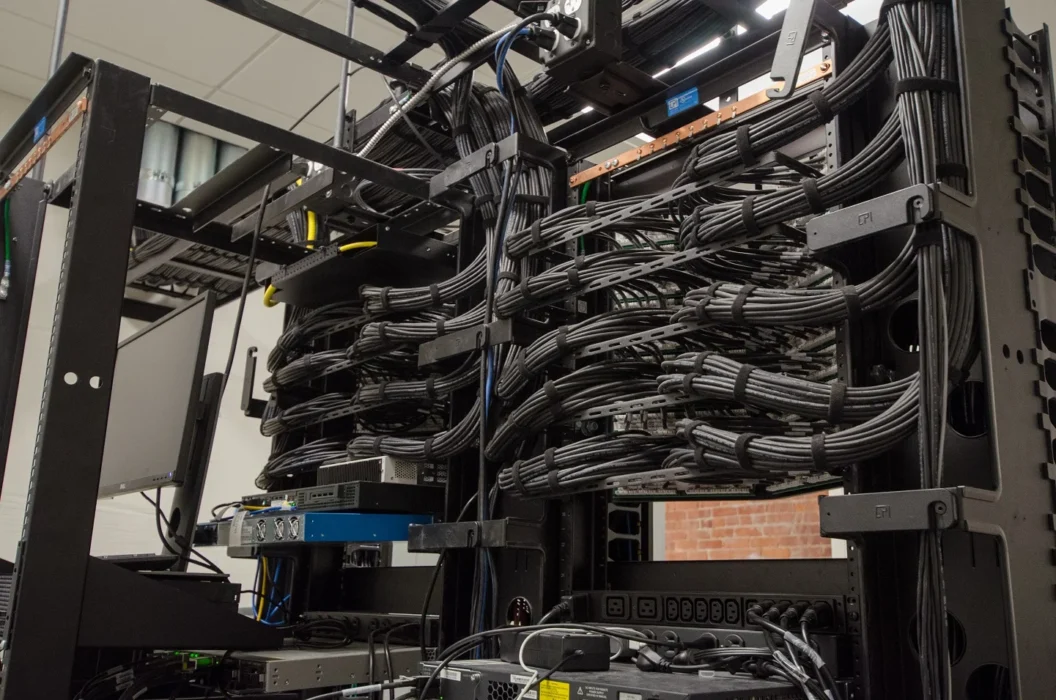
If your office, warehouse, or facility runs on a network of computers, security systems, or smart devices, you already depend on low voltage cabling. But to get that system working safely and efficiently, you need the right hands on the job — low voltage cabling contractors.
These are the specialists who design, install, and maintain the physical backbone of your technology — the cables that power communication, security, and automation systems.

What Is Low Voltage Cabling?
Low voltage cabling refers to wiring systems that carry 50 volts (V) of electricity or less. Unlike standard electrical wiring, which powers lighting and heavy machinery, low voltage systems handle communication and data transmission.
Common low voltage systems include:
- Internet and data networks (Ethernet, Cat5e, Cat6, Cat7 cables)
- Security cameras (CCTV)
- Access control and alarm systems
- Audio/visual setups
- Intercom and paging systems
- Building automation and smart controls
In short, low voltage cabling is what keeps modern businesses connected and secure.
What Low Voltage Cabling Contractors Do
Low voltage cabling contractors are trained professionals who plan, install, and test all the structured cabling that connects your technology infrastructure. Here’s what they typically handle:
1. System Design and Planning
Before a single cable is pulled, contractors evaluate your building layout, network requirements, and future expansion plans. The goal is to design a structured cabling system that supports high-speed communication, scalability, and reliability.
2. Cable Installation
They run and terminate cables throughout your facility — from server rooms to workstations — ensuring each line is properly shielded, labeled, and tested to industry standards.
3. Equipment Integration
Contractors connect devices like routers, switches, patch panels, and security systems into one unified network that works seamlessly.
4. Testing and Certification
Every cable is tested to confirm data integrity and performance. Certified reports are often provided to guarantee compliance with industry codes (such as ANSI/TIA or BICSI standards).
5. Maintenance and Troubleshooting
After installation, low voltage contractors handle routine maintenance, upgrades, and quick repairs to prevent downtime and signal loss.

Why Your Business Needs a Professional Low Voltage Contractor
1. Prevent Network Failures
Bad wiring leads to signal drops, slow internet, and frequent downtime. A professional ensures proper terminations, labeling, and testing so your systems run smoothly.
2. Code Compliance and Safety
Electrical codes vary by region. Certified contractors know the rules and ensure your installation passes inspection while reducing fire or interference risks.
3. Scalable Infrastructure
A professional setup makes future upgrades easier. If your business expands, you can plug in more devices without ripping out old cabling.
4. Better Performance
Well-installed cabling reduces interference and data loss — meaning faster networks, clearer audio, and more reliable video feeds.
5. Cost Efficiency Over Time
Cutting corners with DIY wiring or unqualified labor might save money upfront but leads to expensive repairs later. A certified contractor gets it right the first time.
Qualities to Look for in a Low Voltage Cabling Contractor
When choosing a contractor, look for the following qualities:
- Experience – Proven history with commercial or industrial projects.
- Certifications – BICSI, RCDD, or manufacturer-specific credentials.
- Attention to Detail – Clean, labeled, and organized wiring.
- Strong References – Reliable reviews and past project results.
- Support and Maintenance Plans – Ongoing assistance after installation.
Ask potential contractors for project documentation, cable test results, and warranty terms to ensure accountability.
Low Voltage Systems in Modern Workspaces
Businesses today rely heavily on connectivity. From video conferencing to smart lighting, every system links back to a low voltage network. A few real-world examples:
- Offices: Structured cabling supports internet, phone, and Wi-Fi access.
- Warehouses: Security cameras and automation systems depend on data cabling.
- Hospitals: Patient monitoring, communication, and alarms all run on low voltage systems.
- Retail Stores: POS systems, CCTV, and digital signage depend on reliable cabling.
In short, without low voltage cabling, the modern workplace would stop communicating.
How to Prepare for a Cabling Project
If you’re planning to install or upgrade your cabling infrastructure, here’s how to prepare:
- Assess Your Needs – Identify all systems that rely on network or power communication.
- Plan for Growth – Design for your current and future bandwidth requirements.
- Hire Certified Professionals – Choose a contractor with relevant experience and certifications.
- Request a Site Survey – Let them evaluate your space and provide a detailed quote.
- Schedule Downtime Carefully – Coordinate installation during off-hours to avoid business disruption.
Final Thought
A reliable cabling network is the foundation of every modern business operation. Without it, communication slows, systems fail, and productivity suffers.
Hiring a qualified low voltage cabling contractor ensures that your data, security, and communication systems stay connected, efficient, and future-proof.
When it comes to your network infrastructure, don’t just get it installed — get it done right.
Need certified cabling professionals? Find and hire verified low voltage cabling contractors on Tealpot — the trusted platform connecting skilled blue-collar workers with businesses across the country.

